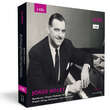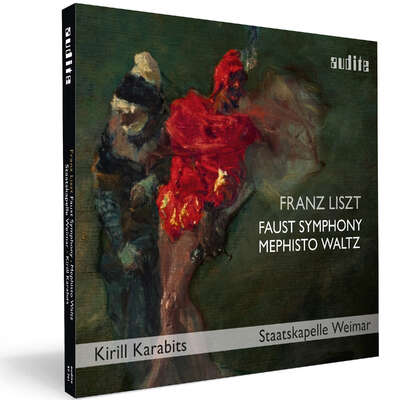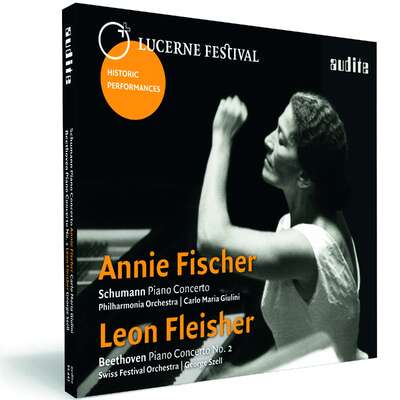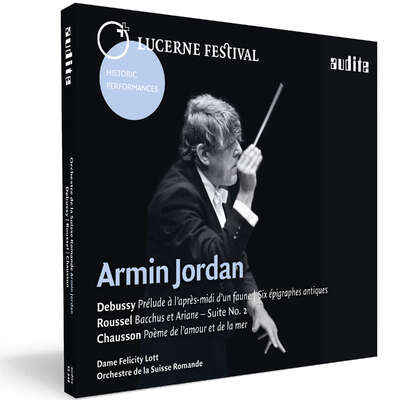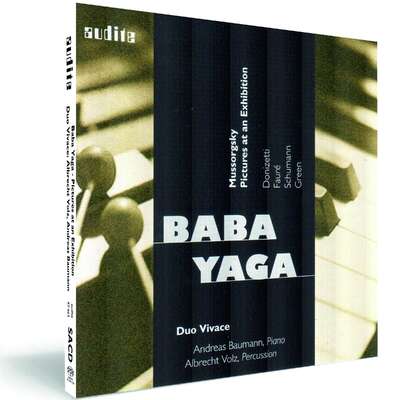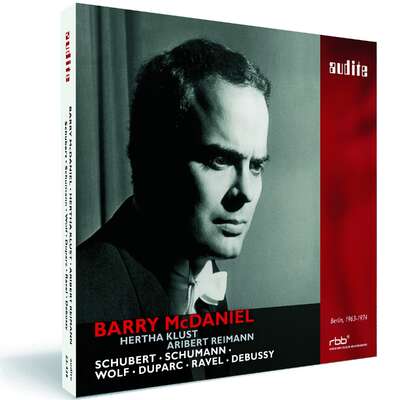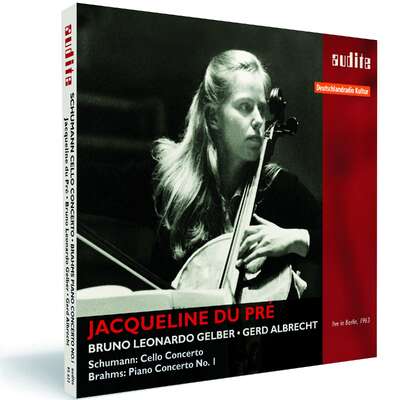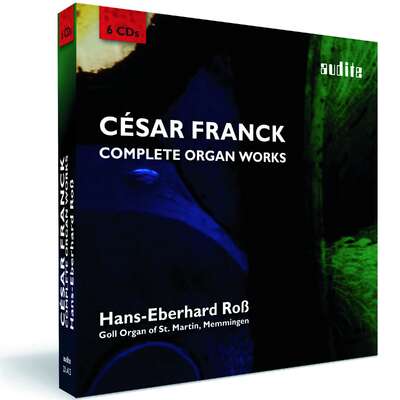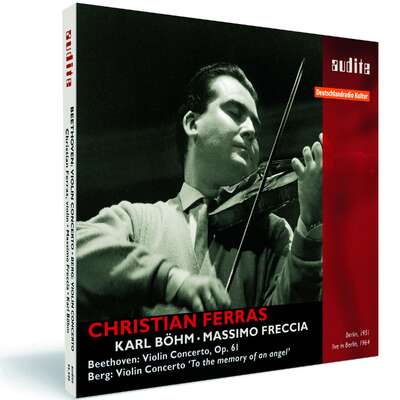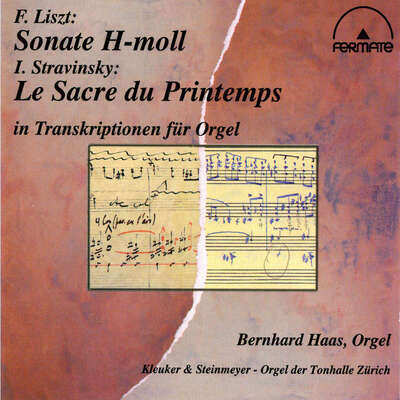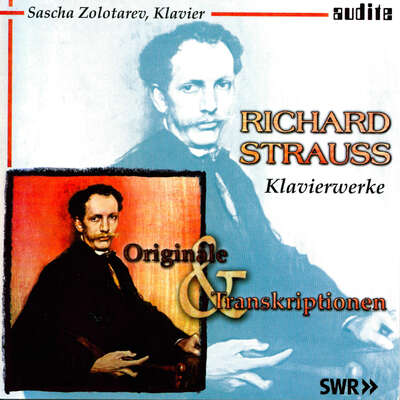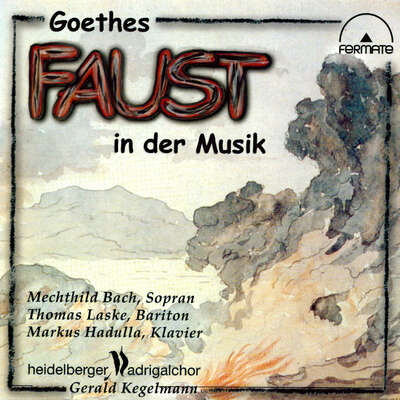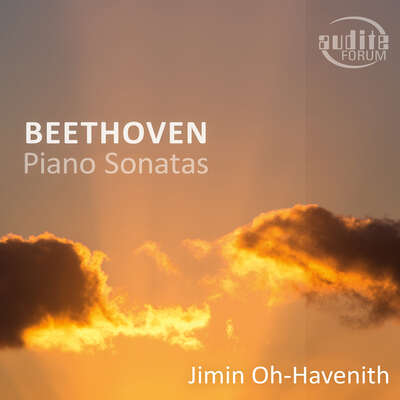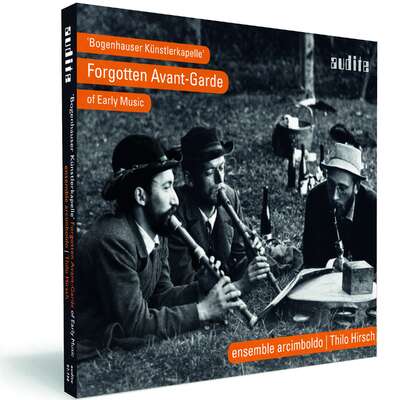
Auto-Rip
This third and final volume of Jorge Bolet’s Berlin radio recordings presents previously unreleased repertoire novelties. Once again, the Cuban-born artist sets standards with his interpretations of great romantic and modern piano music.more
This third and final volume of Jorge Bolet’s Berlin radio recordings presents previously unreleased repertoire novelties. Once again, the Cuban-born artist sets standards with his interpretations of great romantic and modern piano music.
Track List
Details
| Jorge Bolet: The Berlin Radio Recordings, Vol. III | |
| article number: | 21.459 |
|---|---|
| EAN barcode: | 4022143214591 |
| price group: | CL |
| release date: | 11. January 2019 |
| total time: | 224 min. |
Bonus Material
- digibooklet
-
Producer's comment
First-hand impressions of producer Ludger Böckenhoff [German]
- DSO Nachrichten 1-2/2019
Informationen
Repertoire Novelties Jorge Bolet:
Reviews
International Piano | Winter 2024 | December 1, 2024 An aristocrat of the piano
[…] During the 1960s and beyond Bolet was a frequent visitor to Germany. He attracted a substantial following in several German musical centres,Mehr lesen
Crescendo Magazine | Le 1 juin 2020 | Patrice Lieberman | June 1, 2020 | source: https://www.cres...
JOKER DE CRESCENDO - PATRIMOINE
Jorge Bolet, grand parmi les grands
Dès la première étude, les moyens techniques hors-pair, l’extraordinaire beauté sonore et l’infinie gamme de couleurs de Bolet font de chacune de ces oeuvres un joyau.Mehr lesen
Diapason | n° 683 - Octobre 2019 | Gaetan Naulleau | October 1, 2019 Le dernier romantique
En marge de sa discographie officielle (et tardive), une avalanche d'archives enrichit le legs du pianiste cubain Jorge Bolet, maître d'uneMehr lesen
Quand il décède le 16 octobre 1990, emporté à soixantequinze ans par l'épidémie de Sida qui fait rage, Jorge Bolet est pleuré comme un maitre parmi les maîtres. Les hommages le relient tous à un ancien âge d'or du piano et soulignent sa formation dans l’entourage de Godowsky. Un pédagogue quasi muet, corrigeait Bolet, dont les deux véritables héros furent Hofmann et Rachmaninov. Son grand cycle Liszt, publié à partir de 1978 par L'Oiseau-Lyre puis Decca, l'a fait connaître aux mélomanes du monde entier, ainsi que d'impressionnantes tournées – cent cinquante dates en 1982, entre lesquelles il trouve encore le temps d'apprendre l'extravagant concerto de Joseph Marx.
« Le pianisme romantique de Bolet évoque les géants du passé » : le titre de l'article qui encensait, dans le New York Times, le concert du 25 février 1974 au Carnegie Hall était devenu sa carte de visite. Le concert, produit et enregistré par RCA, allait entrer dans la légende. Dans le New York Times encore, Harold C. Schonberg rappellera dans sa nécrologie qu'à « une époque où l'image sonore dominante du piano était percussive, ses mains semblaient couvertes de velours [ ... ]. Cette haute silhouette, majestueuse et digne, apportait sur l'estrade une touche de glamour qui ne caractérisait pas la jeune garde. »
Jorge Bolet serait-il mort au milieu des années 1960, son image serait tout autre. La critique le rangeait alors parmi les stylistes méticuleux mais hautains, un peu coincés. L'élégance aristocratique dont on lui saurait gré deux décennies plus tard semblait alors désuète. En 1964, c'est un homme lassé par des années de « demi-famine » qui fête son cinquantième anniversaire. Un triomphe retentissant à Londres, en 1961, n'avait eu aucune suite. Avoir fourni des mains et une bande-son à Dirk Bogarde, dans un biopic hollywoodien sur Liszt, était son seul titre de gloire. Ses collègues enregistraient à tour de bras mais Bolet n'avait que six LP à son actif (Prokofiev, Chopin, Liszt). Certes, aucun n'est captivant. Le décollage de sa carrière, après le coup d'éclat de février 1974, vaudra pour sa discographie.
Berlin années 1960
C'est dire l'importance des témoignages qui peuvent compléter·le portrait officiel et donc tardif. Un coffret foisonnant mais confidentiel de Ward Marston a ouvert la voie en 2014, suivi par des bandes radio berlinoises triées par Audite (cf. n° 667). Le triple album qui referme la série est doublement précieux en ce qu'il documente les années 1960, et parce qu' il nous fait entendre, pour l'essentiel, des pièces auxquelles Bolet ne reviendra pas en studio. Par exemple les Métamorphoses symphoniques tressée par Godowsky sur des thèmes de La Chauve-Souris, l'un de ses chevaux de bataille. En 1963 à Berlin, il met un point d'honneur à camoufler leurs figures acrobatiques au bénéfice d'une galerie de personnages charmeurs et joueurs. Athlétique mais faisant oublier l'instrument, flamboyant et nonchalant, un must.
S'il fout déchanter devant les Etudes op. 25 (1968), c'est par la faute d'un traitement sonore bizarrement lissé qui châtre les attaques. Les études pétillantes s'enlisent sur un clavier ouaté – un comble pour celui qui prisait tant les Baldwin. En toute logique, le Lento en do dièse mineur en pâtit moins. Aux polonaises, aussi corsetées que dans l'album Everest de la même époque, on préfère nettement les divagations de la Ballade en sol mineur de Grieg, dont les variations se déploient telle une immense étude rêveuse de sonorités (1961). Les trois lmages de Debussy surprendront par leurs trajectoires unifiées, dont le cantabile reste la boussole – Poissons d'or atypiques et voluptueux.
Schumann s'invite en héros dans le triple album. On savait par un disque Decca et deux live quel interprète génial du Carnaval fut Bolet, mais qui l'avait etendu dans la grande Sonate en fa mineur? Comment diable fait-il pour laisser filtrer tant d'élans, de folie, d'ambiguïtés de rythme et d'instabilités d'humeur dans les figures d'éloquence qu'il cadre sans compromis? En 1964, dix ans avant Carnegie Hall, un Bolet singulièrement « allumé » dans le finale. Schumann encore (revu par Liszt) pour un Frühlingsnacht sublime où, comme toujours chez Bolet, la vocalité du clavier se libère par les inflexions sophistiquées du rubato. Les accords rebattus deviennent un grand frémissement nocturne, le clavier s'embrase à l'appel des·voix lointaines.
Vers le Saint-Laurent
Le miracle de Carnegie Hall fut-il vraiment le tournant de sa carrière ? ldée à nuancer, nous assurent les rédacteurs érudits du site collaboratif jorge-bolet. webs.com (une mine). Un premier acte de reconnaissance s'était joué fin 1970, lors d'un concert de gala réunissant à New York une dizaine de pianistes majeurs. Le lendemain on ne parlait que de lui. Alicia de Larrocha, qui jouait aussi, ne trouvait pas de mot pour ce qu'elle avait applaudi dans les Réminiscences de Lucia di Lammermoor et la Paraphrase sur Rigoletto (dans le coffret Marston ... et sur YouTube).
L'éditeur canadien Yves St-Laurent lève le voile sur ces années charnières avec cinq live, dont quatre à I'Université d 'Indiana où Bolet enseigna de 1968 à 1977. Dix jours avant la soirée de gala d'octobre 1970, il rode en bis la Paraphrase sur Rigoletto, avec un bagout divin et des rubatos plus chaloupés (quelques pétouilles aussi, ce qui peut se comprendre après les douze Etudes d'exécution transcendante, qu'il enchaînait volontiers).
La soirée d'août 1971 n'apporte rien d'essentiel aux autres témoignages du pianiste dans les mêmes oeuvres (Préludes de Chopin, Variations Handel de Brahms, Campanella de Liszt...). Assez bien captee, la bande du 15 octobre 1969 offre·en revanche un ajout déterminant à sa discographie. Soirée saturée d'ombres: d'abord les quatre scherzos de Chopin, théâtre de pulsions violentes et d'embardées mettant les rythmes à vif – avec une finition pianistique proprement inouïe dans le n° 3, où la prise de risques est maximale. Après quoi une « Appassionata » aussi impérieuse et vive semble aller de soi – l'impatience anxieuse d'un premier mouvement sans répit fait écho au meilleur Serkin, mais le finale tanguera un peu. Clou de la soirèe, la Mephisto-Valse, course à l'abîme insensée aux rythmes cinglants. Les voluptés de la partie centrale n'apaisent pas le sentiment de menace oppressante. En bis, les Réminiscences de Lucia appelleraient tout l'attirail des superlatifs pour décrire ce qui chante, palpite, parade et brille.
De mème que cette Mephisto-Valse surclasse nettement la version plus prudente pour Decca, la Sonate en si mineur du 5 février 1972 (New York, Tully Hall) saisit l'audirteur à la première note pour ne plus le lâcher. Et Bolet, malgré l'effervescence de l'instant, donne le sentiment d'avoir toujours l'oeil rivé loin devant. Précisons que la qualité sonore du document, avec les quatre Ballades de Chopin en première partie, le réserve aux aficionados. Qui seront également curieux du concert donné en février 1974 une semaine avant celui de Carnegie Hall, avec quasiment le même programme mais deux bis supplémentaires.
Sur la Toile
Le portrait de Bolet s'est également élargi sur la Toile, avec une douzaine de pirates, certains précaires, mis à disposition sur YouTube. Entrez « Jorge Bolet recital », vous le suivrez à Bloomington encore, Tanglewood, Londres (1977, Carnaval transcendant), Hambourg (à visiter au moins pour l'Opus 110 de Beethoven, qu'il programmait régulièrement), à I'Université du Maryland au printemps 1974 (autre répétition générale du 25 février, où il expérimentait d'ailleurs un ordre différent), au Metropolitan Museum de New-York pour son soixante-dixième anniversaire (encore les Préludes de Chopin, toujours transcendants). Et les climax en série du concerto de Marx, face auquel Rachmaninov semble un stoïcien en toge, n'attendent que vous (avec Mehta, 1982).
On repousse le moment de découvrir l'ultime apparition new-yorkaise, le 16 avril 1989, d'un homme inquiet, qui n'a pas donné que des concerts glorieux les mois précédents. Pur pirate, chaise qui grince, réverbération démesurée. Schubert au centre (Sonate D 959 et lieder transcrits par Liszt), flanqué par deux fresques en miroir. D'abord Bénédiction de Dieu dans la solitude, flamboyant – prier soit, mais en faisant chanter chaque atome du piano de la terre au ciel. Enfin I'Ouverture de Tannhäuser, où Bolet galvanisé soulève la montagne quinze ans après le concert qui se terminait ainsi, dans la même salle, et a changé sa vie.
Scherzo | 01.09.2019 | Rafael Ortega Basagoiti | September 1, 2019
Calidad técnica de sonido excelente, tanto en las tomas monoaurales como en las estéreo, para un álbum completamente recomendable que sin la menor duda disfrutarán los admiradores de este gran pianista.Mehr lesen
Fono Forum | Juli 2019 | Ingo Harden | July 1, 2019
Drei von drüben
lngo Harden zu neuen alten Klavieraufnahmen
[…] Auch die Berliner Rundfunk-Aufnahmen von Jorge Bolet (1914-90), denen Audite eine dreiteilige Serie gewidmet hat, sind in dieser Hinsicht nichtMehr lesen
International Piano | May 2019 | Bryce Morrison | May 1, 2019
This third and final volume of Jorge Bolet’s Berlin recordings (1961-1974) provides ample confirmation that he was one oft he finest pianists oftheMehr lesen
Bolet’s playing ranges from „blow your socks off“ virtuosity (heard here in the Strauss-Godowsky paraphrase in Die Fledermaus) to a „safety comes first“ approach. His Emperor Concerto (with Moshe Atzmon) is as poetic as it is imperious, and his performance of Schumann’s Third Sonata (the „Concert sans orchestre“) features tonal opulence and grand sweeping lines. Bolet may have been celebrated latterly for his „divine showness“ but his way with the finale’s wild prestissimo tells us that his speed and dexterity were no less divine. His intensity, too, in the shuddering tremolandi climax – like a sudden bolt of lightning – reminds you of music as anarchic as anything in Schumann.
There is sensuous magic in Bolet’s Debussy, even when he is ponderous in Masques. His Chopin Etudes Op. 25 are among the most musical on mood, effortlessly crossing the Rubicon from pragmatism to poetry. Delectably light-fingered in No 6 and a true singer oft he keyboard in No 5, he is magnificent in No 12, riding the ocean wave with idiosyncratic grandeur. His Schumann-Liszt Frühlingsnacht and Strauss-Godowsky blaze with a brilliance known to few pianists.
Transfers are admirable and these memorable discs come luxuriously packaged with several photos of Bolet, including one with Boston, his beloved pug.
Piano News | Mai/Juni 3/2019 | Carsten Dürer | May 1, 2019
Jorge Bolet ist und bleibt einer der größten Pianisten des 20. Jahrhunderts. Dass nun auch weiteres Repertoire mit ihm bekannt wird, ist dieser Dreierserie mit je 3 CDs von Audite zu verdanken.Mehr lesen
Deutschlandfunk | 11.04.2019 | Philipp Quiring | April 11, 2019 | source: https://www.deut...
Sternstunden
Der Pianist Jorge Bolet
Jorge Bolet stand wie sein großer Rivale Wladimir Horowitz für eine aussterbende romantische Klavierästhetik. Erstmals wurden BerlinerMehr lesen
Obwohl Jorge Bolet zu den großen Ausnahmebegabungen des vergangenen Jahrhunderts zählt, existiert bis heute keine Biografie über ihn.
Der gebürtige Kubaner steht in der von Czerny und Liszt ausgehenden, von Leschetitzky und Anton Rubinstein fortgeführten, romantisch-virtuosen Tradition des Klavierspiels. In den USA erhielt er seine Ausbildung bei Leopold Godowsky und bei dessen Schwiegersohn David Saperton.
Er debütierte bereits siebzehnjährig in der Carnegie-Hall unter Fritz Reiner und konnte einige Jahre später zwei bedeutende internationale Wettbewerbe gewinnen. Doch sein virtuoses Spiel kam nicht überall gleichermaßen an, einige Kritiker fanden seinen Stil zu unmodern. So suchte Bolet sein Glück zunächst in der Politik als Diplomat, bis er nach dem 2. Weltkrieg noch einmal bei Abram Chasins Unterricht nahm und dann durchstartete.
Sein Spiel war gleichermaßen geprägt von Noblesse und einer scheinbar mühelosen Virtuosität, die er jedoch nie als Selbstzweck ansah.
www.ClassicsToday.com | April 2019 | Jed Distler | April 8, 2019 Historic Gems: More Prime Jorge Bolet From Audite
Throughout these archival recordings you get a realistic picture of Bolet’s luminous sonority and his sense of projection. This is the real Jorge Bolet.Mehr lesen
www.musicweb-international.com | Friday April 5th | Jonathan Woolf | April 5, 2019 | source: http://www.music...
This 3-CD set is the third and final volume in the sequence of Berlin radio recordings made by Jorge Bolet. Recorded between 1961 and 1974 all theMehr lesen
The Etudes were recorded in 1968 in splendid sound with Bolet on powerfully communicative form, bringing a rich coloristic palette to the Aeolian Harp, drollery to No.4, plangency to No.7 and true con fuoco to No.10. If No.9 tends to float less like a butterfly and sting rather more like a bee, the Winter Wind has an irradiating ferocity to it. His 1974 Beethoven Concerto performance in Paris with the Berlin Radio Symphony and Moshe Atzman – a decided asset throughout – offers robust and commanding power in similarly fine stereo sound. Some of the wind harmonies sound rather jarring, but the horns are on impressive form and Bolet proves expressive and technically accomplished. It’s a reading that marries majesty with sensitivity.
Both Schumann’s Third Sonata and Grieg’s Ballade in G minor are heard in mono. The former receives a particularly attractive reading, notably in the third movement variations, whilst the Grieg is at its very best when Bolet explores the music’s flightier variations, notably an ingeniously witty Allegro capriccioso and the burlesque frivolity of No.10. Was it for reasons of radio timing that Bolet cut the music – for example he excises the whole of No.12? Altogether around three minutes (or so) of music is lost. Franck’s Prélude, Aria et Final is another example of his way with a work that is also available on a Marston release.
The final disc is quite wide ranging, and includes a bullish Chopin Andante spianato and Polonaise, those three characterful Polonaises, heard in excellent 1966 stereo, and a richly contoured Images Book II. Of particular interest in the light of Bolet’s promotion of new music is Dello Joio’s Second Sonata of 1943 (January 1966, stereo). Full of rhythmic vivacity and astringent sonorities its harmonically drifting slow movement is equally well surveyed by Bolet. Just what would his Bartók have sounded like? His Godowsky offers a suitably ebullient and virtuoso envoi.
The remastering does as much justice to Bolet’s tonal qualities as it can – which is a significant amount – and Wolfgang Rathert’s bi-lingual notes are succinct and helpful.
Correspondenz Robert Schumann Gesellschaft | Nr. 41 / April 2019 | Irmgard Knechtges-Obrecht | April 1, 2019
Ein historischer Gipfelmoment der Klavierkunst, den man nicht verpassen sollte, zumal dessen technische Aufarbeitung mit modernen Mittel zu einem echten Hörgenuss führt.Mehr lesen
Gramophone | March 2019 | Jeremy Nicholas | March 1, 2019 | source: https://www.gram...
According to Audite’s booklet, this is the final volume of Bolet’s (West) Berlin recordings made between 1961 and 1974. The two earlier volumesMehr lesen
Bolet’s legions of fans will need no words of encouragement from me to invest, for there are several valuable additions to this great pianist’s discography. Not least among them is a superb live performance of the Emperor Concerto, boasting an especially exuberant and forthright finale, captured (uniquely in this set) in 1974 by ORTF in Paris. Preceding that are the complete Chopin Op 25 Études from 1968, full of delectable things, bold, confident and paraded in Bolet’s wonderful range of touch and colours, among them the cello like plangency of No 7 and the fire and brimstone of No 11 (a breathtaking ‘Winter Wind’). If No 9 is more kangaroo than ‘Butterfly’, it will surely put a smile on your face. There are also three of Chopin’s Polonaises (Nos 3, 4 and 6) that are new to the discography.
Debussy is a composer who one does not normally associate with Bolet. Perhaps hearing him in Images Book 2 and Masques (both from 1961) will change perceptions. On the other hand, as one of the piano’s great tone colourists, maybe we shouldn’t be surprised. If there is a surprise to be had it is that he was drawn to Norman Dello Joio’s Piano Sonata No 2 of 1943 which, among other novelties, has a last movement in the unusual key of C flat major. Bolet revels in its harsh, expressionist effusion of rhythmic and technical challenges. Schumann is more familiar Bolet territory, though not his Piano Sonata No 3, the least played of the three (the so-called Concerto Without Orchestra). Given that Bolet was at his best in front of an audience, as with most of the recordings in this set, there is no sense of a studio performance, such as there was towards the end of his career. He makes a substantial (and in my view beneficial) cut in the finale.
Disc 2 has the Grieg Ballade, a piece with a particular Bolet association for this writer: on one memorable evening in the late 1970s after supper in my apartment with Bolet and some mutual friends, we managed to lure him to the piano on which happened to be the score of the Ballade. (After hearing that, we were treated to a late night recital from the Bolet back catalogue including Cuban dances and his own ending of the Don Juan Fantasy.) It is a piece Bolet obviously enjoyed. This account was recorded in October 1961 (the same day as the Debussy pieces, and the earliest session here) and appears, as does another Bolet favourite, Franck’s Prélude, Aria et Final (the work that follows it on disc 2), on Vol 2 of Marston’s retrospective of the pianist (7/15) heard live in Amsterdam in 1987.
Disc 3 begins with an account from 1971 of the Andante spianato and Grand Polonaise which I did not enjoy at all. It sounds thoroughly bad-tempered, the Andante played as if it were Rachmaninov and the fioritura passages in the Polonaise tight and scrambled. After the three Polonaises (Bolet at his most magisterial) come two specialities: Schumann-Liszt Frühlingsnacht (unmissable) and the J Strauss II-Godowsky Symphonic Metamorphosis on Die Fledermaus (sui generis). All in all, a pianophile delight.
www.artalinna.com | 9 February 2019 | Jean-Charles Hoffelé | February 9, 2019 | source: http://www.artal... Les inédits d’un génie
Jorge Bolet au sommet de son art, capté idéalement sur de très beaux pianos par des ingénieurs du son saisissant toutes ses couleurs et son grand jeu polyphonique. Quel plaisir tout au long de ce troisième volume qui clôt la publication de ses enregistrements pour la Radio de Berlin.Mehr lesen
Süddeutsche Zeitung | 21. Januar 2019 | Harald Eggebrecht | January 21, 2019 | source: https://www.sued... Noble Wehmut
Die Etüden op. 12, vier Polonaisen und das Fantaisie-Impromptu op. 66 von Frédéric Chopin stellt Bolet leuchtend transparent, durchaus auch mit machtvollem Zugriff, aber nie als bloße Pianistik dar. Robert Schumanns f-moll-Sonate op. 14 wird zum nachdenklichen Fest romantischer Erregungen, Claude Debussys "Images II" werden zu traumverlorenen Gebilden, gewonnen aus feinstem Klanggespür.Mehr lesen
www.pizzicato.lu | 12/01/2019 | Remy Franck | January 12, 2019 | source: https://www.pizz... Virtuos und ausdrucksvoll
Audite präsentiert die letzte Folge der RIAS-Einspielungen mit dem in Kuba geborenen amerikanischen Pianisten Jorge Bolet (1914–1990). Die drei CDsMehr lesen
Die erste CD enthält die 12 Etüden op. 25 von Frédéric Chopin in einer meistens unbeschwerten, leichten und fast verspielten Aufführung sowie eine in keinerlei Hinsicht aufsehenerregende, routinierte Darbietung von Beethovens 5. Klavierkonzert.
Da ist die Interpretation von Robert Schumann’s 3. Klaviersonate auf der zweiten CD schon von einem anderen Kaliber. Sie ist frisch, leidenschaftlich drängend und sehr spontan. Ein Highlight sind auch die Auszüge aus der selten zu hörenden Ballade op. 24 von Edvard Grieg, die dennoch ein richtiges Meisterwerk ist, ein Werk von epischer Größe und ungewöhnlichem Ausdruck von Schmerz und Trauer. Hier wie auch in César Francks ‘Prélude, aria et final’ erreicht Bolet eine große rhetorische Ausdruckskraft.
Technisch Beeindruckendes gibt es auf der dritten CD mit den Chopin-Polonaisen, Godowskis Strauss-Metamorphosen sowie der 2. Klaviersonate des amerikanischen Komponisten Norman dello Joio, der diese Komposition laut eigener Aussage bewusst so komponierte, dass Jorge Bolet darin seine phänomenale Technik und die Kraft seiner massiven Hände zeigen könnte.
Jorge Bolet is at his best in the virtuoso pieces of this program, but he can also be very expressive like in the passionate account of Schumann’s Third Sonata or in Grieg’s dolorous Ballade op. 24. Beethoven’s Fifth Piano Concerto is definitely not interesting enough to match the level of the solo performances.
Audiophile Audition | Apr 15, 2019 | Gary Lemco | source: https://www.auda...
Bolet’s legato, his sterling trill, inflected diminuendos, and those precious, music-box scales that take us to the explosive mix that defines the aristocrat of piano concertos.Mehr lesen
